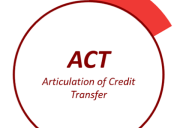You have /5 articles left.
Sign up for a free account or log in.
Over one-third of first-time students transfer at least once during their academic journey, but they often lose earned college credit when entering a new institution. Part of this credit loss can be attributed to a lack of information about which credits will be accepted and how they will apply to degree programs. Without this vital information, students may be unable to make informed decisions about their education, resulting in potentially longer times to degree completion and additional costs.
We believe that providing students with this information can help lessen the time to degree and boost degree-completion rates. But doing so will require collaboration on a national level. To this end, Ithaka S+R is launching a new, public, nonprofit, national credit mobility website. This universal credit transfer explorer will go live later this year with data from an inaugural set of institutions across three states, thanks to collaborations with the Connecticut State Colleges and Universities system, the South Carolina Commission on Higher Education, and the Washington Student Achievement Council. Unique among similar services, the site will show how credits earned elsewhere transfer and apply toward degree programs at the multiple destination colleges and universities featured on the site.
This new credit mobility website will connect students, institutions and all those who support them with easily accessible, up-to-date and accurate information on how credits transfer and count toward degrees. The website is inspired by and builds upon the groundbreaking CUNY Transfer Explorer (T-Rex) created by the City University of New York and Ithaka S+R, which has helped over 150,000 users explore, discover and use the over 1.6 million credit transfer rules for the CUNY system’s 20 undergraduate colleges.
The first group of institutions to be featured as destinations on the new website will include Aiken Technical College (S.C.), Central Connecticut State University (Conn.), Coastal Carolina University (S.C.), College of Charleston (S.C.), Connecticut State Community College (Conn.), Denmark Technical College (S.C.), Lander University (S.C.), Shoreline Community College (Wash.), Southern Connecticut State University (Conn.) and Washington State University Everett (Wash.). Expansion to additional institutions within each state—and beyond—will continue throughout 2024 and 2025.
Much like CUNY’s Transfer Explorer, the new universal credit transfer explorer website will enable any user to investigate how courses and other learning experiences will count toward the requirements of degree and certificate programs offered by participating institutions. To provide this functionality, each participating institution is being supported to establish an automated data feed that regularly provides updated evaluated course and prior learning equivalencies, course catalog information, and program requirements from student information systems, degree audit software and/or other relevant source systems. The institutions need only maintain their own source systems and updates will be automatically and regularly reflected on the universal credit transfer explorer website.
Connecting these vital pieces of information across multiple institutions will allow students and the faculty and staff members assisting transfer students to explore how their earned or planned credits will count toward degrees. It will also provide institutions with the tools they need to improve credit-transfer rules to better recruit and retain increasingly mobile students. Improving student credit mobility can help students throughout their higher education journeys, including when earning college credit in high school, re-entering higher education after a break or moving between institutions to complete a degree.
The institutions and state agencies collaborating on the site launch recognize the importance of the effort and are ready to dive in. As Alex Tadio, WSU Everett’s director of admissions, notes, “I’ve witnessed firsthand the challenges students face in transferring credits. This initiative represents a collective effort to streamline the credit transfer process, making higher education more accessible and efficient for students.”
Following the grant-funded launch of the website with the initial group of states and institutions, Ithaka S+R will enhance the website by adding functions and features and scale participation rapidly to institutions and higher ed systems across the country. Today’s students are highly mobile across institutions, regions and states; it is the norm for students to compile and attempt to integrate credits earned from multiple sources. Higher education needs to continue to adapt to that reality, and the new universal credit transfer explorer will help a growing cohort of participating states and institutions to do just that.






